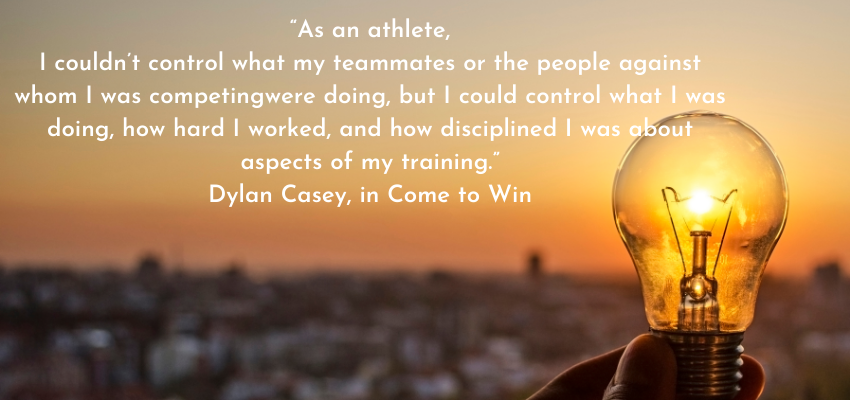 By Darius E. Bennett, Esq.
By Darius E. Bennett, Esq.
“As an athlete, I couldn’t control what my teammates or the people against whom I was competing were doing, but I could control what I was doing, how hard I worked, and how disciplined I was about aspects of my training.”
— Dylan Casey, in Come to Win
California native Dylan Casey was a professional cyclist for the U.S. Postal Service Pro Cycling Team from 1998 until his retirement in 2003. Casey began cycling during his undergraduate years at the University of California – Santa Barbara, encouraged by local cyclists to join them on rides embellished by views of the mountains and the sounds of the Pacific Ocean. The group engaged him in competitive sprints, and generally motivated him to continue in the sport throughout his years in college. In time, the spell was cast. Even when Casey accepted a position at a consulting firm in Philadelphia –with further plans to attend business school– his spirit was unbreakably bound to cycling. In fact, the sport’s enchantment was irrepressible, and in the end its magnetism drew him home to California. He would finish his cycling career as an Olympian, a Pan American Games gold medalist, and one of only three people to win US national championships in both road and track cycling. He puts his success down to training and hard work.
It is practice that makes the master.
In 2001, a few months after 9/11, I found myself listlessly battling a deep depression. At the time, I was unaware that the general malaise that consumed my energy and stifled my motivation was as serious as that. Three years earlier, the highs of life as an undergraduate had ended with graduation, but I had post-graduate plans. Two years earlier, my post-graduate fellowship in Chile had reached the limits of its funding. Consequently, I was obligated to return to the United States. I moved in with a friend in Wilmette. Suddenly, I was unemployed and generally unoccupied. It would be five months before I was hired for full-time work as a “project specialist” for a communications company that planned continuing medical education for doctors and nurses. I borrowed money from my parents and my oldest brother, and rented an apartment in the Rogers Park neighborhood of Chicago, alongside the tracks of the commuter train that returned suburban workers to their homes on the North Shore. Feeling at once relieved and defeated, I quietly fell into that depression.
I fed my depression literal food. Full racks of beef ribs. Entire pints of Häagen-Dazs. Frozen pizzas by the rounds. Bread and cheese by the loaves and half pounds. Food made me feel something –apart from bloated and full!– and I consumed as much of it as my shame would allow. I would walk miles to meet with friends, not for exercise, but because I could not afford to use my transit card for anything more than trips to and from work, which had depleting transfers along the way. What would have come of me if it were not for those walks and, most importantly, my family and friends?
One friend particularly encouraged me to get out of the house and be more socially active. She proposed I join her for line dancing at a bar near Wrigleyville. She insisted that the patrons at this country bar were friendly and that the dancing was charming and fun. She was also inviting me to meet her new love interest. She wanted my opinion. I felt honored! During those years, I would have followed her anywhere; so, I went.
We entered a door that opened to another world, a simple life on the corner of an unmemorable crossroad and a busy bus route, cater-cornered to a 24-hour IHOP. Who was the magician that hid this place in plain sight, but under a flickering street lamp? Inside there were energetic line dances, gliding waltzes, swiveling cha chas, intimate two steps and a rather seductive slow dance aptly named shadow dancing. I was invited to two step immediately, by a stranger. And, as I left the dance floor, another invitation would meet me before both feet exited the spotlight. That night, I clumsily bruised many toes and wildly elbowed friendly faces that responded with overly-patient, compassionate smiles. At the end of the night, I had not realized that my last dance was with the teacher. She suggested I come to Tuesday’s class for beginners and learn the basics. I did, every Tuesday until I became the practiced dancer inviting the uninitiated for their first dances. I could show others how to dust their shoes for gliding, and could exhibit the same patience I had been shown. It was insufferable for an unlearned dancer to position themselves in the middle of the floor during a complicated line dance, especially if it was Dolly Parton’s “Peace Train”! Smiling and polite, I would escort those dancers to the edge of the dance floor, suggesting it would be safer for everyone if they danced there, away from the expert spins and improvised kicks. My weekends country dancing were fun, simple, affordable and revitalizing.
At some point, my friend stopped showing up. I called to check in with her. She explained that the bar was a better fit for me, and she urged me to keep going. I hurriedly dressed for that Tuesday’s lesson, a new intricate line dance, and rushed off to be with my new friends.
My friend and I eventually grew apart. Years later, during a counseling session, I realized that I had not been practicing dance; rather, I had been practicing getting out of the house. My friend lovingly had wooed me away from my depressive behaviors and replaced them with an active life that made me feel fully alive. And, it was through those dance practices that I mastered my depression.

